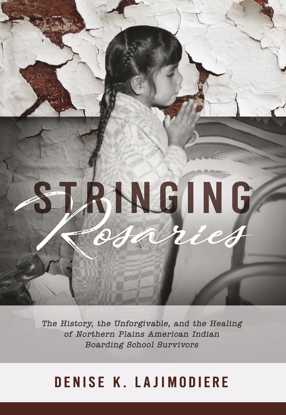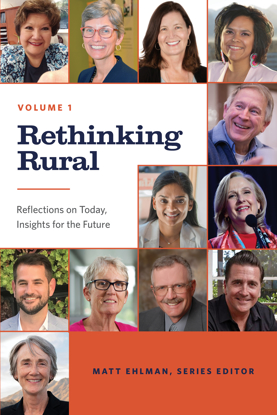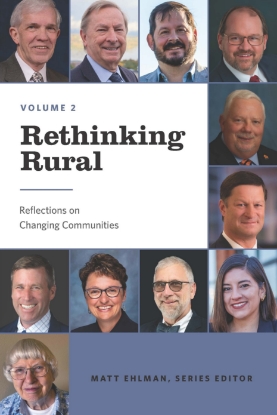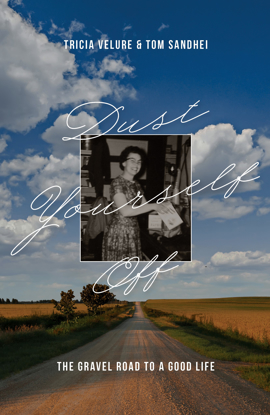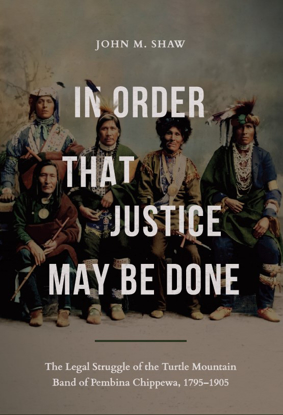History
Still
More than four hundred Russian and Romanian Jewish homesteaders settled on about eighty-five farms in McIntosh County, North Dakota, beginning in 1905. After clearing rocks and boulders, growing wheat and flax, raising cattle and chickens, and selling cream from their sod houses, most were successful enough to own their own land.
Still is a history of five generations, a family we meet first as they flee Odessa and last as they make their ways as American Jews . . . and as Dakota farmers, as students and storekeepers, as soldiers and lawyers, and even as a teen in an international competition who stands face-to-face with Netanyahu. Rebecca Bender and Kenneth Bender answer the question recently posed to Rebecca by a newspaper reporter: Are you still Jewish?
Paperback, 370 pp
Stringing Rosaries: The History, the Unforgivable, and the Healing of Northern Plains American Indian Boarding School Survivors (hardcover)
Denise Lajimodiere's interest in American Indian boarding school survivors’ stories evolved from recording her father and other family members speaking of their experiences. Her research helped her to gain insight, a deeper understanding of her parents, and how and why she and her siblings were parented in the way they were. That insight led her to an emotional ceremony of forgiveness, described in the last chapter of Stringing Rosaries.
The journey to record survivors’ stories led her through the Dakotas and Minnesota and into the personal and private space of boarding school survivors. While there, she heard stories that they had never shared before. She came to an understanding of new terms: historical and intergenerational trauma, soul wound.
Stringing Rosaries presents a brief history of the boarding school programs for Indigenous Americans, followed by sixteen interviews with boarding school survivors, and ending with the author's own healing journey with her father.
Hardcover, 332 pp., 41 black and white photographs, updated listing of more than 400 US boarding schools by state, appendix, bibliography, and index.
Rethinking Rural, Volume 1
Rethinking Rural: Reflections on Today, Insights for the Future
Rethinking Rural Series, Volume 1
250 pp. / paperback
Matt Ehlman, Series Editor Introduction Matt Ehlman, Rethinking Rural Series Editor, host and organizer of the Morning Fill Up, a series of public gatherings intended to inspire and engage and to put creative energies into action for the betterment of the entire community. Chapter 1: My Second-Generation Immigrant Experience in Rural America Taneeza Islam, attorney at law specializing in civil rights and immigration law and co-founder of South Dakota Voices for Peace and Justice Chapter 2: The 2020 Census: Counting Everyone Once, Only Once, and in the Right Place Deirdre Dalpiaz-Bishop, geographic advisor and coordinator for the 2020 Census, chief of the Decennial Census Management Division Chapter 3: Indian Country Antonia Gonzales (member of the Navajo Nation), anchor and producer of National Native News; past associate producer for Native America Calling and television reporter for a CBS affiliate in New Mexico Chapter 4: An Educated People—Higher Education in Rural America Heather Wilson, PhD, president of the University of Texas—El Paso, past president of South Dakota School of Mines and Technology and the twenty-fourth Secretary of the United States Air Force Chapter 5: One Farmer’s Rural Perspective Ron Rossman, co-owner of Rosmann Family Farms, founding member of Practical Farmers of Iowa; nationally known for testifying before the US Congress on agricultural issues and hosting international guests learning about new farming approaches Chapter 6: Stories That Bring Us Together Paula Kerger, with Craig Langford; Kerger: president and CEO of PBS and initiator for access to early learning through PDS KIDS; Langford: speechwriter for the mayor of Washington, DC, and the president of PBS Chapter 7: Resilient, Vibrant, and Always Changing—the Rural I Know Kathleen Annette, PhD, member of the White Earth Band of Ojibwe, past president and CEO of Blandin Foundation and past deputy director of field operations of the Indian Health Service Chapter 8: Getting Things Done in Rural America: Examining Trends in Rural Philanthropy Laurie Paarlberg, professor of philanthropic studies at Indiana University Lilly Family School of Philanthropy and the O’Neill School of Public and Environmental Affairs at Indiana University Chapter 9: Rural America Adam Steltzner and Pam Gildersleeve-Hernandez; Steltzner is a NASA engineer working for the Jet Propulsion Laboratory and chief engineer for the Mars 2020 Project; Gildersleeve-Hernandez is executive director at CUE, a member-driven education nonprofit. Chapter 10: Righting Relationships: One Perspective on Rural America Robert Grant, pastor during the 1980s farming crisis; currently professor of Environmental and Historical Theology at St. Ambrose University (Davenport, IA); author of books on environmental ethics; winner of the Eddy Award for environmental education Afterword Matt Ehlman Bibliography About the Contributors Index About the Series About the PressContents
Rethinking Rural, Volume 2
Anticipated ship date is late January 2026.
Rethinking Rural: Reflections on Changing Communities
Rethinking Rural Series, Volume 2
paperback
Matt Ehlman, Series Editor
Rethinking Rural Volume 2: Reflections on Changing Communities presents an introduction by Dwight Burlingame and insights from ten scholars and citizens as expressed in their answers to two questions: How would you describe rural America today? and What do you imagine it will be like for the next generation? Each of the authors share their concepts and their answers based on the lens through which they see the world. This anthology is the second installation in the Rethinking Rural series, aimed at highlighting how people of diverse backgrounds and experiences understand rural historically and how they foresee its future, adding to the ongoing discussion of the multifaceted nature of rural America.
Dust Yourself Off: The Gravel Road to a Good Life
Dust Yourself Off: The Gravel Road to a Good Life is the true story of a farm woman in 1940s/50s North Dakota who recovered from a series of shocks and tragedies – and the surprising ways in which she did that. “This project began because I wanted my kids and grandkids to know their grandmother,” said the book’s co-author Tom Sandhei of his mother, Muriel. “She was a remarkable woman.” After Sandhei took the story as far as he could on his own, he teamed up with Tricia Velure, a personal historian and writer from the neighboring town. “Tom and I unknowingly grew up on farms less than 20 minutes from each other in North Dakota, 30 years apart,” said Velure. “Decades later, we met in the Twin Cities, where we lived 10 minutes apart. We were meant to meet and write this story together!”
Dust Yourself Off chronicles Muriel’s life in Fort Ransom, North Dakota, known as “Little Norway” for its forested hillsides above the Sheyenne River Valley and predominantly Norwegian settlers. Readers follow Muriel and her family through farm life during the settlement period, World War I, Great Depression, World War II, and the 1950s. While the co-authors describe Muriel as a quintessential Norwegian American farm girl in North Dakota, she was forced to leave home at age 19. Death and tragedy visited her regularly in her 20s and 30s, when time and again she challenged the traditional norms of what it meant to be a farm woman in her day. Muriel’s quiet yet bold courage helped create this touching family story, rich in historical details and local color.
Velure never met Muriel, who died at age 82 in 2004, but she calls Muriel a “bonus grandmother” and believes readers will feel the same affinity. “This book will appeal to readers who enjoy farm and small-town stories, Norwegian American history, and inspiring stories of everyday women. If you wish you knew your grandparents’ life story, this is a book for you.”
About the Authors
Tricia Velure is a personal historian who helps elders share their life stories with their families. She grew up on her family’s cattle and small grains farm near Kathryn, North Dakota, and earned degrees in English and history from Valley City State University and a master’s degree in history from North Dakota State University.
Tom Sandhei is a retired school administrator who grew up on his parents’ and grandparents’ farms near Fort Ransom, North Dakota. He graduated from Valley City State College, began teaching, then earned a master’s degree in elementary school administration from North Dakota State University. His career in education spanned almost 40 years. Velure and Sandhei have lived in suburban Minneapolis/St. Paul since the 1990s.
In Order That Justice May Be Done: The Legal Struggle of the Turtle Mountain Band of Pembina Chippewa, 1795-1905
Tribal lands in tribal hands restrained the pursuit of profit. When the cultural identity of the Turtle Mountain Band of Pembina Chippewa was challenged by European Americans—who conceived of progress in terms of cultivated farmland—a tribal-federal conundrum occurred. Historian John M. Shaw untangles the culturally and legally contested concepts of land and its uses and ownership, providing a dynamic legal genesis of the Turtle Mountain Chippewa and their intentional action for change. Shaw presents a crucial analysis of federal policy and Native American resistance.
“Shaw systematically informs the reader of historical context and lays out the complex cultural influences—the nucleus of an emerging nation—of the Pembina Chippewa, providing unique insights into historical, legal, and political struggles. An overarching theme is the contrast and comparison of Indigenous and Western worldviews relative to international diplomacy. Shaw’s laser focus presents a critical and authentic analysis of social, economic, political, and cultural events that enveloped the Pembina Band of Chippewa and the United States of America.”—Les LaFountain, Tribal Educator and Historian; former Turtle Mountain Band of Chippewa Tribal Council Representative; former Legislative Assistant to the United States Senate Indian Affairs Committee
“In Order That Justice May Be Done is an excellent history of the struggle experienced by the Turtle Mountain Band of Chippewa to gain recognition as a tribe and to gain control of their homeland. The documented efforts of Chief Little Shell and Attorney John Bottineau deserve to be recognized and understood.”—Carol A. Davis, Senior Associate Tribal Nations Research Group; Turtle Mountain Community College Co-founder and Second Interim/Acting TMCC President
LCCN: 2022951183
ISBN: 978-1-946163-56-1
6" x 9"
440 pp., paperback
black & white photos and maps
bibliography and index
Tribal-Federal Relations | History 19th Century | Indian Reservations—Law and Legislation
About the Author: John M. Shaw grew up where George Washington led the Continental Army across the Delaware River and surprised the Hessian garrison at Trenton, New Jersey, on Christmas day, 1776. One of John's earliest childhood memories recalls his parents bundling him up on Christmas mornings to watch the annual reenactment. This tradition sparked his lifelong interest and passion for history, culmininating in an MA in American Indian Studies and a PhD in History, both from The University of Arizona.
In graduate school, a colleague informed John about a compelling microfilm of an eloquent prayer, address, and legal brief on behalf of the Turtle Mountain Band of Pembina Chippewa. Compiled by Métis tribal citizen and attorney John B. Bottineau, these inspiring documents provided a unique Indigenous perspective on the injustices of federal Indian policy. The tribe's legal struggle for land, sovereignty, and justice derived from the power to narrate their own side of the story through articulate chiefs and delegations, confirming that North Dakota's most populace Indigenous community remain a powerful people with a compelling history.
John contributed multiple entries to Making it in America: A Sourcebook on Eminent Ethnic Americans (2000) and The Encyclopedia of United States-American Indian Policy, Relations, and Law (2008), as well as several book reviews for UCLA's American Indian Culture and Research Journal and the New Mexico Historical Review. He has taught Native American and U.S. History courses for the departments of American Indian Studies, American Multicultural Studies, and History at The University of Arizona (1996–2003), Minnesota State University Moorhead (2004–2005), and Portland (Oregon) Community College (2005–present).

























